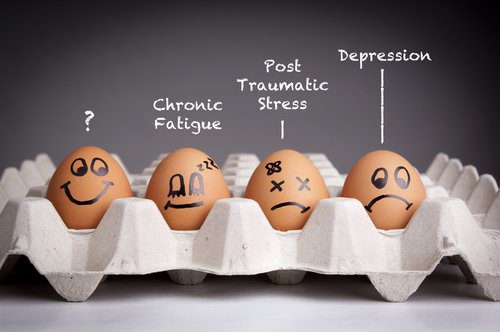
Few situations are the butt of so many jokes as therapy. I mean, I’ll admit it. Mental disorders can be pretty funny. Some social psychologists define “funny†as the intersection between inappropriate and comfortable. The things we find funniest are the things that are just a little bit outside of our comfort zone, in defiance of all our unspoken norms. I think that’s why we tend to find “head-shrinks†funny… we’re all just a little uncomfortable with the idea.
Have you ever gone to therapy? I have. As a teenager. And to be honest, once the conversation gets rolling, a large percentage of people that I know have been too. In some grad school programs, it’s actually required to go to a psychologist regularly in order to monitor stress levels. I know people who have gone in order to confront anxiety disorders, people who were referred to a therapist when their stomach kept giving them troubles and the doctors couldn’t find a solid reason for it, and plenty of couples who have sought counseling during rocky periods.
So Why Is There Still Such a Taboo?
Think about it: if you said that you had to go see the doctor, no one would bat an eye. But if you excuse yourself to visit a therapist, you might be worried about a couple people viewing you askance, wondering what’s “wrong†with you.
Mental health and physical health are closely linked. We know that when patients who are confronted with severe physical ailments are given therapy and treatment to help them process their emotional state, they’re much more likely to recover and they have fewer complaints of pain and complications.
Knowing about this close link, it might be important to start thinking of caring for our mental health the same way that we might take care of our physical health.

Situations When You Should Really Think about Therapy
You suspect a mental health disorder: About 1 in 5 Americans suffers from a mental health disorder. And about 1 in 20 people suffer with a severe mental disorder that affects their daily life. That means that out of your circle of 50 or so acquaintances, you know a few who struggle with severe mental health problems… that someone might be you, actually. Undiagnosed mental health disorders is a big problem, as we tend to self-medicate, and engage in harmful behaviors in order to counter it. Even scarier, we feel like we’re alone, and we’re really not.
Your stressors are out of control: In the 60’s, therapists Holmes and Rahe built a scale of common stressors and their impact on mental illness. What’s important to note about this stress scale is that it’s not just about negative stressors, like divorce or losing a job. In fact, some of the biggest stressors are happy events. The “stress†factor is determined by how much of a life change it is. For example, marriage and retirement are both tagged as bigger stressors than even the death of a close friend. When each incident piles on top of the other, it increases your chances of mental illness. For example, divorce is rated as a 73 on the scale. Change in financial situation is a 38 and foreclosure of a loan is a 30. Therefore, if you’re dealing with both divorce and bankruptcy (incidences, unfortunately, which often are linked) then you’re probably already at 142, which puts you at a moderate risk of mental health challenges. Each life change adds an emotional burden which, if not handled well, can become severely taxing. In order to adjust, it can take a little bit of professional guidance.
You’re stuck, and don’t know how to solve something yourself: This often happens in relationships. We find ourselves stuck in harmful patterns, or simply lacking the connection and trust that we wish we had. And yet, we seldom realize the good that counseling can do in order to shake us out of our patterns and find productive solutions. Many of us fear that opening our relationship to therapy is the death-knell and we don’t want to admit to a problem. However, therapy has been proven to be very effective in countering relationship problems, however small or large. Simply having a non-judgmental third party can help you see things in a new way, but even better, a trained therapist can help you find communication strategies that can increase your intimacy and resolve roadblocks.

Finding the Right Approach for You
Where you should go for effective care will depend on many factors. Ultimately, you’re the only one who can decide which approach you want and what situation you feel comfortable enough to be honest and proactive in. Here are some examples of therapy styles and approaches:
- Group therapy/support groups: This approach can be especially effective if you struggle with a burden that makes you feel isolated amongst your usual circle of friends, family, and acquaintances. Often, this type of therapy is advised for people who struggle with addictions or disorders, people who have undergone trauma, and people who deal with the challenges of a loved one which affect them deeply. For example, it can be very helpful for parents who have children struggling with addiction, as it helps you know that you’re not alone, and helps you find solutions for troubles in your life.
- Cognitive behavioral therapy: This approach is built on the philosophy that our reality is created by our thoughts. Therefore, if we can closely examine our thought-patterns, we can find solutions and set up more productive patterns of thought. This therapy approach is where the idea of countering negative self-talk comes from. It’s often shorter-term and goal oriented.
- Psychodynamic therapy: This is the technique that most people picture when imagining therapy. It’s a situation where the patient is allowed to simply talk things out, with the idea that when everything is brought to the surface, we’re able to find the things that are holding us back and resolve them.
- Interpersonal theory: This approach is usually used for patients struggling with depression. It can be useful in many aspects, though, allowing patients to examine their relationships and interactions and understand how their conditions and actions are affecting their personal connections.
Thanks for another great guest article.
Have you ever needed therapy? Â I needed therapy after having our second child. Â Post-Partum Depression is real. Â Yes, I was one of those people that felt like you should just suck it up. Â If you need help, don’t be ashamed. Â

 Do you want to join a fun, supportive group of women? Come on over to our supportive, loving and fun facebook group. Mamas and Coffee® is all about the REAL of womanhood. Join Us.
Do you want to join a fun, supportive group of women? Come on over to our supportive, loving and fun facebook group. Mamas and Coffee® is all about the REAL of womanhood. Join Us.
- No Makeup, Real Talk, and Squirrel Moments: Mamas and Coffee Gets a Show! - January 23, 2026
- What Are The Types of Stroke - November 22, 2025
- What is Carotid Artery Thrombosis? - November 17, 2025

Great information, Sybil. I’m glad you shared this guest post today.
I believe sharing this you give people permission to overcome the taboo of getting help.
I’ve gone to counseling when younger and as an adult.It did help to get through some tough times & made a huge difference.
Thank you. Many tend to view counseling as a sign of weakness, that is sooooo not true. It takes much strength and courage to seek help.